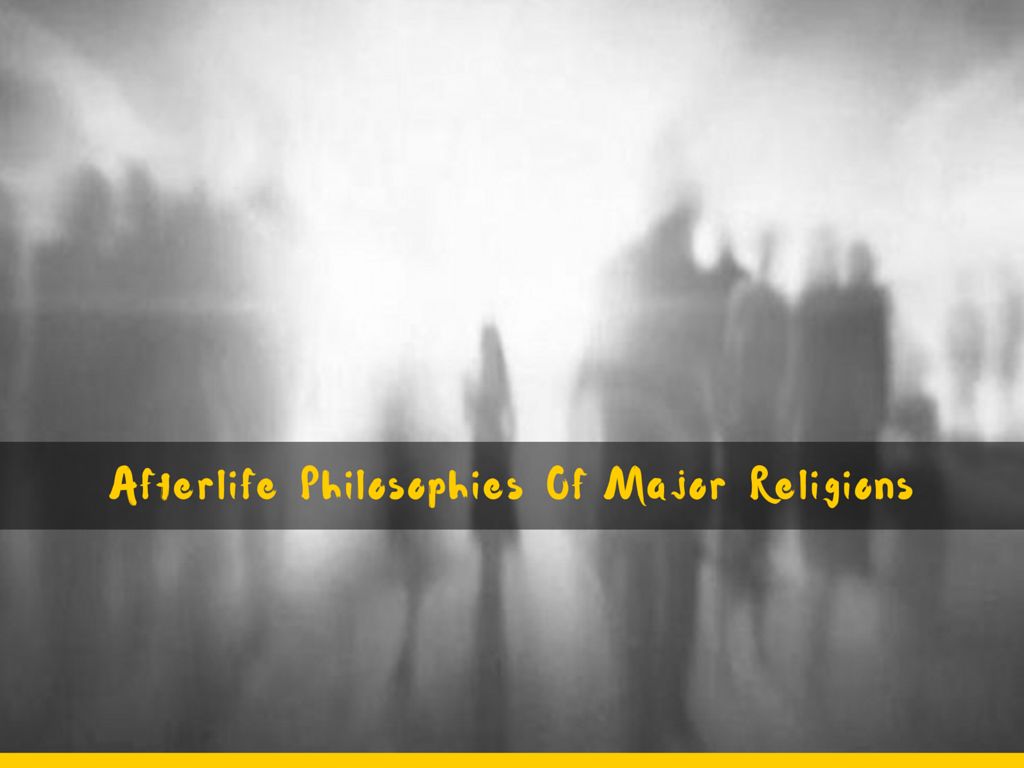Afterlife Philosophies Of Major Religions
This post was last updated on July 23rd, 2023

Everyone holds a different perception for their religion and is one of the most sensitive issues for them. For some people, religion teaches them how to live life and perform their tasks while for some it brings in cultural traditions. For some more people, religion provides them with a common community to establish their connection with people following similar practises. Though it is our perception about religion that makes every religion different, but every religion preaches you to become a good person who acts in a way to maintain peace in the universe.
Every religion has unique practices and there are many philosophies nurtured by various religions about the most mysterious topic that everyone thinks about, i.e., what happens after death? The afterlife is one of the most curious topics that has been deeply discussed in many religions and as a matter of fact, their beliefs see some similarities with each other too. Almost all religions believe in afterlife, reincarnation, heaven and hell.
What Is An Afterlife?
‘What happens after a person dies’ used to be a question that increased our curiosity since childhood. Since we are born, we many times have discussions with people to know what their views are about afterlife and this question is just not limited to religious preachings.
While many religions believe that life continues after death in the form of reincarnation, there are religions that say about liberation of souls and sending them to heaven or hell as per their deeds in the past life. The continuation of the soul in a new life is known as afterlife and the afterlife is expected to be decided on the basis of our time spent in our previous lives.
Various religions cherish unique thoughts about life after death and presented here are afterlife philosophies of major religions that are actually food for thought:
1. Christianity
In Christianity, people falling under various denominations such as Catholics, Protestants, Baptists and other Christians follow different beliefs. But the core of Christian belief about the after life is on the basis of their conduct on Earth, people find place in heaven or hell. While people who have conducted good deeds find place in heaven, where they enjoy the presence of God and a freedom from sufferings and sins, hell is a place for wicked people where they will have to suffer from hell-fire.
Most of the Christians believe that Jesus died on the cross for the sins made by humanity in order to give us salvation. There are many references of hell and heaven in the Bible and it is also stated that people who believe and follow what the Christ says will achieve salvation and end up in heaven while those who disobey Jesus’ sayings will get rotten in hell. In order to attain salvation, many Christians confess their sins in front of a Catholic priest and if he/ she truly repents, then they are forgiven. They get saved from the hell-fire.
2. Hinduism
As per ancient Hindu beliefs, the soul or Atman is said to be entrapped in the circle of life, death and rebirth called world of ‘samsara’. Hinduism states that life in this world in reincarnated form refers to unhappiness or suffering that is generally because of the law of karma. This law operates on the ideology that every good or bad deed is eventually returned to the individual in the form of reward or punishment. If a person dies before getting his/ her punishments, then he/she gets born again to reap what they sowed in past life form and the process continues till he/ she attains moksha or liberation. After the soul attains moksha, it is believed to be merged with the cosmic Brahma.
Even the talks of heaven and hell is prominent in Hindu religion too. Heaven known as ‘swarga’ belongs to people who have believed in God and performed good deeds while hell called as ‘narka’ is a place for people who have never believed in God and his sayings and has been sinful. It is also said that in hell, the sinful Atmans are tortured by demons for a stipulated period of time and after then, the soul returns to life again to participate in the process of reincarnation.
3. Islam
Many Muslims believe that the present life is a kind of preparation made for the next existence in a way that death acts as a transporter from one world to another. The Islamic Prophet had stated three things that can help a person even after his death – prayers of their children, knowledge which they had shared and the charity they made in the name of Allah. There are some other Muslims who believe that death is the complete end of the physical life and a beginning of a period of rest till the judgement day or resurrection day. On this day, Allah judges the living and the dead on the basis of their deeds. People belonging to Islam even believe that after death a good person sees the images of God while a sinful person gets the vision of hell.
4. Buddhism
Buddhism is one religion that doesn’t think of death as a continuity of the soul but it considers it as an awakening. Lord Buddha was prompted by the awareness of death to find out the truth behind people competing to own worldly pleasures. It was Lord Buddha who found that death is certain for any person who thinks only about world with materialistic attitude. This is why Buddhists think that death is a break from this materialistic world. Buddhism largely shares the Hindu philosophies of reincarnation, karma and moksha.
Nirvana is the Buddhist term for liberation and it refers to liberation from the cravings of materials and possessions. Like Hinduism, even Buddhists believe that life in corporeal form is a suffering and the objective is to release the soul from the body to disintegrate it from the habits, memories and sensations of the past life. They also believe that if a person is unable to attain nirvana, then he/ she will be reborn in a new life and the status of new life will depend upon his/ her virtues in the past form.
You may like this
Recommended For You
Best Auspicious Days For Buying Gold
Priyadarshini Muduli
A full time passionate writer with imperishable determination to bring healthy, smart and pragmatic changes individually and socially. Concentrate especially on lifestyle, life and personal improvement, relationships, mental health and behavior, viral issues and literature based subjects.




